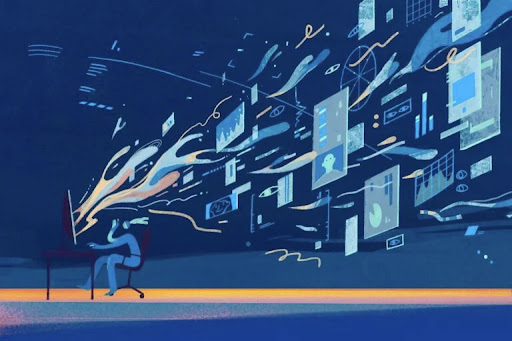
Image by Iris Lei for Popular Science
How might we change the way our data is used so that we, as consumers, have more choice in building our future?
While this is a fundamental driver of the Digital Lab’s work, it can be difficult to visualize all the ways that novel uses of consumer data could transform our lives. But having a north star is important. Envisioning alternate data futures can influence the technical and policy innovations we prioritize, and can help us realize the good and avoid the bad.
So we asked three speculative fiction writers to imagine worlds where consumer data cooperatives enabled alternate options and decisions, and to bring those worlds to life on the page.
Our goal was to envision consumer data cooperatives that may be feasible by 2030. To do this, we identified talented authors and put them in touch with advisors with deep data expertise. These advisors participated in brainstorms and interviews with authors, reviewed the authors’ drafts, and provided feedback.
The result was three short stories that were published in Popular Science this week, each with an accompanying policy response essay by participating data experts:
“Shared Data” by Malka Older is an eco-futurist hypothesis of a world existing and persisting throughout climate disasters. In this tumultuous environment, a shared data hub and cooperative provides real time information, insights, and social interaction spaces in the face of disaster. The policy response essay is co-written by Don Marti, Caroline Sinders and Rebecca Weiss.
“Home@Heart” by Sameem Siddiqui tells the story of a young academic couple who decide to finance their house through a housing union’s interest-free loan program in exchange for ongoing collection of data of the entire household. The policy response essay is written by Nicolo Zingales.
“The Memory of Tomatoes” by Bonnie Jo Stufflebeam illustrates a world in which humans have come to rely on virtual assistants for a vast array of tasks: filtering data-related decisions, running smart devices, and even storing human thoughts and memories. This blend of guarded private spaces and more intrusive connected technologies – all wielding sensitive data – sparks questions as to whether trust in technology is well-placed. The policy response essay is written by Richard Whitt.
We hope that these narratives will help drive social conversations that question our current data dynamic, and promote opportunities for better policies and products that enrich our lives.
How do you think your life could be different with access to a consumer data cooperative? Drop a note to digitallab@cr.consumer.org to let us know.
CR would like to thank the Data Futures Lab at Mozilla Foundation, who helped inspire and graciously funded this work.
This project would not have been possible without the partnership of Simply Secure and the brilliant direction of Melissa Huerta. CR would also like to thank Corinne Iozzio and the team at Popular Science for seeing the potential in these stories and collaborating with us to publish them.
In addition, many experts offered insights that shaped the concept and direction of these stories. Sincere thanks to Jef Ausloos, Afua Bruce, Dan Calacci, Amber Case, Cade Diehm, Meag Doherty, Sarah Drinkwater, Nandini Jammi, Enoch Liang, Robert Zev Mahari, Nicholas Vincent, and Richmond Wong.